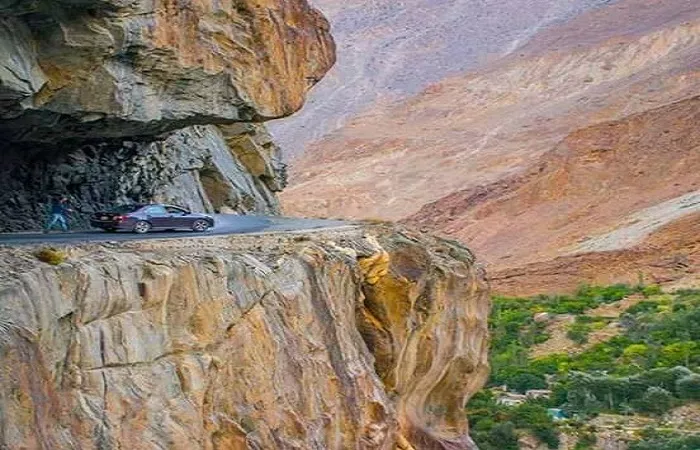
Gilgit Skardu Road; “Karakoram Death Road”
The Gilgit-Skardu Road is the only way for people in Baltistan to connect with the rest of the world. The road is 167km long and runs along the River Indus and the Karakoram Range. It has become a dangerous road and is commonly known as the “Karakoram Death Road” due to fatal accidents and vehicles falling into the river. The road is narrow and has a broken surface, making it difficult to drive on safely.
Gilgit Skardu road starts south of Gilgit near Juglot and goes towards Skardu city. The surface was gravel, but some parts have been paved over the years. The road is winding and only wide enough for one vehicle to pass in some places. In other parts, the road is bordered by a cliff drop of hundreds of meters without guardrails. It takes around 8 hours to travel between Gilgit and Skardu in good conditions. Road can be blocked for weeks due to harsh weather conditions.
Karakoram death road ends in Skardu, which is the capital of the Baltistan Region, at an elevation of 2,226m (7,303ft) above sea level. The road was constructed by Pakistan Army Engineers with the Association of Chinese Engineers in 1982. However, despite efforts to maintain it, the road is gradually becoming a death trap for travelers.
The accidents that occur on the road are alarming and mainly occur due to long travel distances, fatigue, and dozing drivers. The conditions of buses and coasters that are not suitable for this long and dangerous road also contribute to accidents. The road needs safety walls on both sides to prevent vehicles from falling into the River Indus and land-sliding from the Karakoram mountains.
Gilgit-Skardu Road is under construction by the FWO right now, but there are concerns about the width of the road being decreased from 38 feet to 19 feet, and the abandonment of eight proposed tunnels.Safety measures during construction are being compromised, creating an unsafe work zone for workers and a risk for daily commuters passing through landslide-prone areas.
According to the Gilgit Baltistan Government spokesperson, Faizullah Faraq, landslides are due to heavy rainfall and work in progress. He added that 80% of the work has been completed, but this year, two more vehicles have fallen, and nearly 120 people died in the last ten months of 2020.

